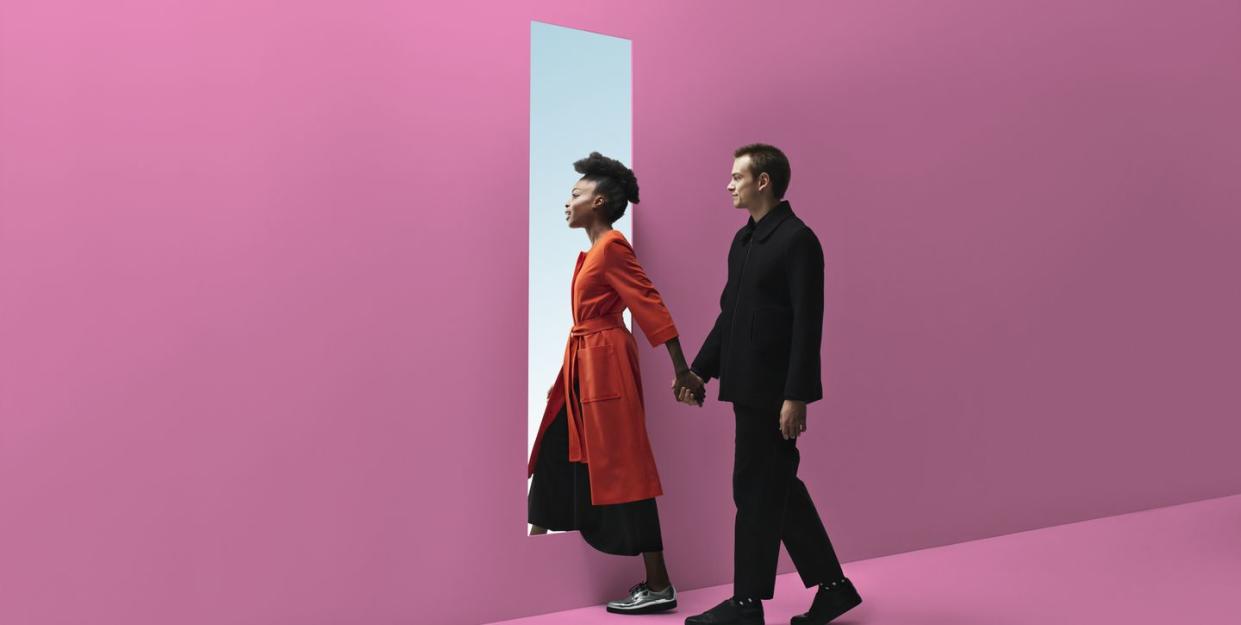What will your relationship look like in five years?

Whether you're in lockdown with your long-term partner or social distancing from your new love interest, you might have had the odd niggle about whether you're in the right relationship. But that's normal, right?
"Most people in relationships have doubts at times, but rather than thinking, 'I don't want to throw this away," you should reframe that and ask yourself, 'What do I need in my life, and is this relationship reflecting that?'" psychologist Emma Kenny explains.
And it seems more of us are doing just that. We're taking longer to find 'the one', too – the average age a woman ties the knot is 30, a whole eight years older than in 1970.
So how can you be sure you're a match made in heaven? Andrew Marshall, marital therapist and author of Are You Right For Me? Seven Steps to Getting Clarity and Commitment in your Relationship believes the answer is a relationship audit.
"It will help you work out if your relationship has staying power, or whether you might need to take action, such as couples counselling," he says.
Here are the six questions to ask yourself:
1. What does your partner do to make you happy?
"One thing all happy couples share is the ability to answer, 'Are you there for me?' with an instant 'Yes'," says Darren Wilk, a therapist from the Gottman Relationship Institute.
"This isn't so much about being there in a big crisis, but the little things your partner does to make you happy." Is he/she supportive when you have a family problem or are tense about work? If the answer is yes, you're on to a good thing.
Do this: Darren says that while women are pros at saying the right thing, men are programmed to show affection rather than articulate how they feel.
"Open your eyes to the little things your partner does, like washing your car or making small talk with your dad. If you don't show appreciation, he or she will stop bothering."
And if your partner doesn't do the grand gestures or the small things? Ask yourself why.
2. Can you show your partner your dark side?
The happiest relationships aren't all smooth sailing. The real bond is made when you can both own up to your mistakes. "Perhaps you're worryingly overdrawn or you've messed up at work," says psychologist Corinne Sweet. "If you're always trying to hide your mistakes because you feel judged, that's a sign the relationship isn't tuned in to you. A grown-up relationship involves being honest about your shortcomings."
Do this: Go back to basics. "Talk, talk, and talk some more," says Corinne. "Long-term relationships hang on conversation, because talking is the route to intimacy. Being able to listen to one another and empathise is guaranteed to grow trust, and from trust comes love.
Loving someone is revealing your innermost secrets and knowing they'll keep them safe. If you don't want to open up – and your partner's not interested in listening – you need to think about where that connection has gone."
3. Are you willing to compromise?
Here's a scary figure: 69 per cent of differences in a relationship aren't solvable. "Well, obviously!" laughs Darren. "You're two different people, of course you won't agree on everything – having the right attitude is all that matters."
Do this: Try to understand where your partner is coming from. If things get heated, slow the conversation down: take a deep yoga breath and then get your one (yes, just one) non-negotiable on the table. When he/she respects that, you can start to agree on the rest. If your arguments are about something intrinsic – such as you wanting children and your partner not – it may not be possible to reach a compromise. If this is the case, it could be kinder to end things now. Friends, family and counselling can help if this is the route you decide to take.

4. Are you scared of being alone?
"Some women think it's better to be unhappy with somebody than to be alone, but by staying in a troubled relationship you're actively choosing unhappiness," says Kenny. Of course, if you're married with kids, this isn't a simple decision, but counselling can help you get clarity. Darren adds that if you're comfortable with being alone, you'll have more to give in a relationship. "Your partner will trust that you're together because you enhance each other's lives, not because you dread spending your weekends solo," he says.
Do this: make a regular date with yourself to enjoy a few hours of solitude.
'Take a bike ride, go shopping or just potter around the house,' suggests Darren. "Until you enjoy your own company, you won't know if your relationship really adds to your life."
5. How's the sex?
Be honest. Are you having sex? Are you enjoying it? Do you feel attracted to your partner? "There's no RDA for sex – and it's something that can dwindle over time – but you have to want to keep intimacy alive, otherwise you're just spending your life with a friend,"says Emma.
Do this: "Not having sex can be a symptom of a bigger issue, or it can be because you've got into a rut," says Emma. "Sex is fantastic for self-esteem and it makes you feel connected to your partner, so make time for it." Remember, though, that your sex drives aren't going to be in sync at all times, and when you don't have such high expectations for them to match, you'll feel much better. Of course, if you're totally mismatched in bed, and you're not willing to compromise, you need to question the longevity of your relationship.
6. What do you row about?
"We all argue, but if there's more rowing than positive communication, it's time to go to relationship counselling to work out new strategies because angry relationships are destructive," says Emma. "If your rows are about trust, work out if that's more about what's happened in your past, or if it's to do with your partner actively breaking your trust."
Do this: If you're always having the same arguments or there are topics you can't discuss, you either need to strike a line under it or deal with them once and for all.
"Ask yourself if your partner will take advantage of you to meet their own needs. If the answer is yes, mistrust has taken root. Only you will know if that means your relationship has gone beyond the point of no return. Therapy can help you build a relationship of trust – with your partner, if possible, but sometimes, in preparation for someone else," says Emma.
This article was originally published in 2017.
Last updated: 07-06-2020
You Might Also Like

